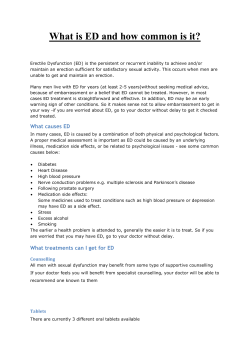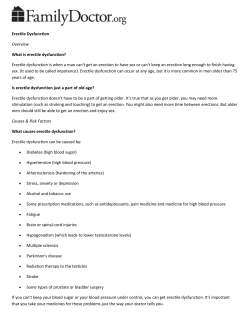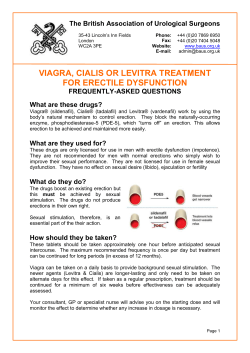
ERECTILE DYSFUNCTION
The British Association of Urological Surgeons 35-43 Lincoln’s Inn Fields London WC2A 3PE Phone: Fax: Website: E-mail: +44 (0)20 7869 6950 +44 (0)20 7404 5048 www.baus.org.uk admin@baus.org.uk ERECTILE DYSFUNCTION FREQUENTLY-ASKED QUESTIONS What is erectile dysfunction? Erectile dysfunction (impotence) is the inability to get or keep an erection sufficient for sexual intercourse. One in ten men (10%) suffer from impotence and it is seen in almost one third (30%) of diabetic men. The ability to get an erection is important to most men, old and young. However, many men suffer erectile dysfunction in silence, without seeking help or advice. How do normal erections occur? A man needs hormones, an adequate blood flow to the penis, intact nerves and sexual desire if he is to achieve an erection. If one or more of these mechanisms fail, erection may also fail. During arousal, nerve impulses travel from the brain to the penis and trigger smooth muscle relaxation in the penis. This encourages blood to flow into the tissues. As the penis fills with blood, it enlarges and becomes erect. During enlargement, the veins in the penis become compressed, blocking the flow of blood out of the penis and, as a result, the erection persists. The penis stays erect until ejaculation is completed or sexual arousal ceases. What physical causes are there for erectile dysfunction? Hormone imbalance A deficiency of male hormones can reduce desire or interest in sexual function. Nerve damage This can result in reduced sensitivity or reduced signals to release chemicals within the penis that cause muscle relaxation. Disease of the blood vessels Blood vessels often become narrowed and hardened with increasing age. This reduces blood supply to the penis. If the penis does not fill adequately with blood, the Page 1 veins will not be compressed and blood will leak out of the penis. As a result, the erection will not be maintained. Trauma Such as injury to the spinal cord. Pelvic surgery Some cancer operations on the prostate, bladder or bowel may result in nerve damage leading to impotence. Drugs Some drugs used to treat high blood pressure or depression, and some sedatives may cause impotence. Smoking and alcohol Those who smoke and drink are more likely to suffer from impotence. In men with diabetes the most common causes of erectile dysfunction are disease of the blood vessels and nerve damage (or a combination of the two). Can psychological problems causes erectile dysfunction? Yes. It is very common to see a combination of psychological and physical causes but pure psychological causes are unusual (less than 1 in 10 of all cases). Erectile dysfunction can be caused by stress, depression, anxiety, relationship problems, embarrassment, guilt and other psychological problems. When a man has difficulty getting an erection, whatever the cause, he will often experience pressure to perform. This can lead to a feeling of inadequacy and a sense of loss of manhood (“performance anxiety”). These are all common emotions for a man suffering from erectile dysfunction. What can I do about the problem? Talk about it with your partner, doctor or nurse. Not all men decide to embark on treatment but, in order to be fully investigated, it is likely that you will be referred to the urology department at you local hospital. You will be seen by either an urologist or by a nurse practitioner. You will be asked about your problem and will have a full assessment, including a physical examination. It is likely that you will need some blood tests if these have not already been done by your GP. Once this assessment has been completed, treatment options will be discussed. What treatments are available? It is your decision as to what treatment you choose. You will, of course, be given guidance as to what is most appropriate for you. Treatment is available on the NHS ERECTILE DYSFUNCTION Page 2 only for patients whose erectile dysfunction is caused by one of the disorders in the Schedule 11 list (see list below). Counselling Some men need psychosexual counselling and will be referred to a specialist in this area. Counselling can be part or all of the treatment required. Tablet treatment First-line treatment for most patients is now tablet treatment using Viagra, Levitra or Cialis. Your GP will prescribe the tablets for you in the first instance. Hormone treatment This is offered to those patients who are deficient in male hormones. Medication can restore hormone imbalance and improve potency. This treatment will not, however, improve erections in men who have no hormone deficiency and may actually be harmful in this situation. Self-injection therapy This treatment involves injecting a drug into the side of the penis each time you want to have an erection (pictured below). The injection causes the muscle tissue in the penis to relax, allowing increased blood flow into the penis. If you choose this option, you will be trained in the clinic how to inject yourself. Injection therapy is very effective but some men find the thought of selfinjection unacceptable. Injections can be used up to twice a week but never more than once in 24 hours. As with all drugs, there are side effects. Occasionally, the erection does not go down and you may need to come to hospital to have the erection reduced. Fortunately, this is not common. MUSE (medicated urethral system for erection) This involves insertion of a pellet of prostaglandin into the urethra (water passage). Erections occur in only 35 - 40% of patients and treatment can be associated with pain or facial flushing. This technique is no longer widely used because of sideeffects and low effectiveness. Vacuum erection assistance devices These provide a simple means of getting and sustaining an erection. The penis is inserted into a cylinder, using a lubricant jelly to ensure a seal at the base of the penis. A small vacuum pump is attached to the end of the cylinder. The pump creates a vacuum and causes blood to be drawn into the penis, causing an erection. A constriction ring is then placed around the base of the penis to trap blood in the penis ERECTILE DYSFUNCTION Page 3 and maintain an erection. The cylinder is then removed. The ring can be left in place for up to 30 minutes. This is a safe and effective form of treatment. Unfortunately devices cannot be supplied by the NHS; the cost of a pump is between £120 - £300. Your nurse specialist will demonstrate how to use this device. Patients will have the opportunity to borrow a device on trial for four to six weeks before purchasing their own. Penile implants This involves surgical insertion of a rod into each side of the penis. The rods can be semi-rigid or inflatable, and are permanent. They probably produce an erection which as good as a normal erection. They are, however, complex mechanisms and are prone to infection and mechanical failure (or both). They tend to be used as a last resort when all other measures have failed and are only performed in certain specialist units. You may, therefore, need to be referred to one of these units for surgery. Specific information leaflets are available for most of these treatments from your specialist nurse or consultant urologist. What are the “Schedule 11” criteria? The rules of the NHS specify that treatment is only provided for erectile dysfunction due to the following conditions: diabetes mellitus; injury (spinal cord or pelvis); multiple sclerosis; poliomyelitis; prostate cancer; Renal failure; severe psychological distress; single-gene neurological disorders; spina bifida; or surgery (prostatectomy & radical pelvic surgery). Are there any other important points? This booklet contains guidelines and advice from professional bodies, together with information about the prescription of drugs. All NHS hospitals have local arrangements with their Primary Care Trusts (PCTs) about which medicines can be used. As a result, some drugs mentioned cannot be prescribed by local hospitals. Treatment of patients will be planned with the doctor responsible for care, taking into account those drugs which are or are not available at the local hospital and what is appropriate for optimum patient care. ERECTILE DYSFUNCTION Page 4 Healthcare professionals are advised to check prescribing arrangements with their local hospital or PCT. Disclaimer While we have made every effort to be sure the information in this booklet is accurate, we cannot guarantee there are no errors or omissions. We cannot accept responsibility for any loss resulting from something that anyone has, or has not, done as a result of the information in this booklet. © British Association of Urological Surgeons (BAUS) Limited Published: March 2014 Due for review: March 2015 ERECTILE DYSFUNCTION Page 5
© Copyright 2025





















